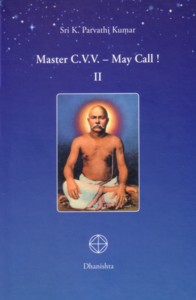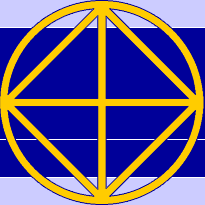Book Presentation
"Master C.V.V. - May Call! Vol. 2"
by Dr. K. Parvathi Kumar

There is a way to understand the synthesis of Existence, when Existence is recollected and we
speak in awareness of Existence, in awareness of Existence we work, in awareness of Existence we sleep, and then
there is One continuous Existence experienced through all. We shall have to remember that there is only
Existence and nothing else.
Master KPK has been transmitting the Energies of Master
CVV and the Path of Synthesis in the West on the MAY CALL Days since 1988. The May Call messages of
Master KPK represent the teachings of Master CVV. They are briefly given here as a first step of His
teachings.
Content: Introduction; Synthesis of Existence; Discipleship; Live Every
Minute Cheerfully; The Living Book; Trust the World Teacher; To Live in the Presence; To Be Impersonal; I AM
Everyone; Observe your Thoughts; Nil None Naught Level; The Brotherhood; Learn How to Think; The Path of Return;
The Distillation Process; Master CVV Prepares and Supplies; The Importance of Male and Female Energies; To be
Normal is Spiritual; Meet Levels; Invocation
Dhanishta – The World Teacher Trust – Global,
Switzerland 2007. ISBN: 978-3-9523145-7-9 : € 19
Copies: The World Teacher Trust-Global • Büelstrasse 17 • CH-6052 Hergiswil • Switzerland
- Book order information
- About the Author
- Online Books K. Parvathi Kumar
- We have a few English copies to distribute for free.
Sample:
Chap. 9. Observe Your ThoughtsIf we are not to get lost in actions, we should recollect the I Am. When we recollect the I Am in us every minute, then each time there is a proposal we will see the why of it. We will know when we come out of our own proposal and then we are out of the thought form. When we don't make an impersonal examination of the proposal that we receive, the proposal carries us and takes us too far. We become a slave of our proposal. Each time a proposal comes, we should examine impersonally how far the proposal is needed. As long as we do not examine we become part of each proposal that comes out of us. But when we make an examination of the proposal impersonally, we are out of the triangle of the thought. We can impersonally see whether we need to act upon the proposal or not. If we do this exercise, in a matter of three to four years much useless actions will end.
The Lord says in the Bhagavad Gita, "A person who has not been able to relinquish the personal proposals cannot be called a Yogi." He says, “For all action the beginning is the proposal. It propels you into action. When the proposal is personal, the action is oriented towards a result. If the proposal is impersonal, it is not result oriented." Thus, we have the proposal, the action and the goal. This is the triangle that binds us. A Yogi is one who has no personal proposals. The more and more the personal proposals cease to come to our mind, the more and more we realise the Existence.
Once, a disciple who was having a brewery visited the ashram of Ramana Maharshi. He went to Ramana Maharshi and asked him how to realise Existence. The Master told him, "Stop brewing", because we keep on brewing many thoughts. The disciple was not satisfied with the answer of the Master and stayed for two more days in the ashram, only to receive some more instructions. After two days he asked again, “Master, please, give me a technique to realise." The Master said again, "Stop brewing." lf we go to the Master and ask how to live in awareness, the Master replies, "Stop brewing", or, "stop cooking". What does he mean by saying, 'stop cooking'? How can we live without cooking and eating? The disciple stayed for two more days, and then he wanted to know for the last and final time if the Master had a better instruction to give him. The Master once again told him, "Stop brewing, stop cooking." He did not understand. He started thinking that the Master was not good. But the sentence, "Stop brewing, stop cooking" was working in his mind. He started cooking upon the thought “stop cooking". After 40 days he understood that he should stop thinking about many things. Later he understood that he should observe his own thought pattern as it comes.
The more and more we observe the thought pattern we are out of it as an observer. When we do not observe it, we are in it. Sometimes we do not know that we are in it. Every time there is a thought, and the thought is not put to self-examination before it is acted upon, we are in the soup. The process of skilful action begins with the observation of the proposal. More often we won't do it. The moment our thought is not observed by us, the triangle pulls us into personally motivated actions. The moment we are motivated by personal action we have all the successive steps of likes, dislikes, disappointments, happiness, displeasure, etc. That is where Master CVV tells us, "Learn, if you can, to remain impersonal." This is the first and fundamental instruction of the Master. He gives us directly the step by which we can cut off all unnecessary actions. Thus, the danger of getting into the triangle and the pentagons, and then getting reversed into Makara and receiving the chain actions, is eliminated at the very root. That is the Aquarian method of reaching realisation soon. It facilitates directly to get into awareness.
Existence and awareness of Existence is common to all. To all of us getting up in the morning is common. But when it comes to the thought, each one of us gets different thoughts. When we remember constantly that the thought should be cut off at its very formation state, then we become very clear in our proposal. This is also the meditation given by the Master. He did not recommend observation of Prana, nor did he recommend recitation of mantras. He only stated, "Think of Me, close your eyes, and observe what is happening inside. If you get a thought, observe the thought and if you remain as an observer of your own thought you will learn to get out of the thought forms that you receive." This is what Master gave us to practise in meditation.

 Circle of Good Will
Circle of Good Will Contact
Contact
